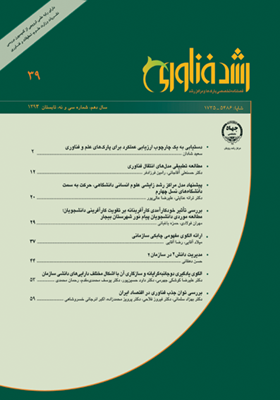نقش مديريت دانش در نوآوري سازمانها
محورهای موضوعی :
1 - -
کلید واژه: وب 2, مديريت دانش 2, سازمان 2, مشاركت اجتماعي,
چکیده مقاله :
در محيط پويا و رقابتي امروز، سازمانها به شدت به افزايش توانمنديهاي نوآوري خود نياز دارند و اين مهم تنها در سايه توجه به منبع ارزشمند دانش و قابليت خلق و بهكارگيري آن حاصل ميگردد. نوآوري سازماني بدون وجود مديريت دانش مشاركتي و پويا ظهور پيدا نخواهد كرد و به همين دليل نفس وجود مديريت دانش، اهميت خيلي زيادي براي سازمانها پيدا كرده است. سيستمهاي مديريت دانش سنتي، عمدتاً در پي تسخير دانش صريح و آشكار به صورت رسمي و نظاممند بوده و در بازكردن قفلهاي دانش ضمني و پنهان موجود در ذهن افراد، موفق نبودهاند. امروزه، سيستم مديريت دانش 2 نشأت گرفته از فناوريهاي وب 2، با رويكرد اجتماعيسازي، همكاري، مشاركت، تشريك مساعي و تعامل بين افراد، سعي در تسخير بزرگترين و ارزشمندترين پايگاه دانش توزيع شده سازماني داشته كه همانا دانش ضمني و نهان موجود در ذهن و ضمير كاركنان سازمان ميباشد. به چنين سازمانهايي كه بر پايه مديريت دانش 2 و سرمايه اجتماعي شكل ميگيرد، سازمان 2 گفته ميشود. تمركز چنين سازمانهايي به جاي سلسله مراتب و كنترلهاي رسمي، به سمت مشاركت اجتماعي و همكاري انبوه كاركنان براي ايجاد خلاقيت و نوآوري سازماني از طريق ظهور شبكههاي اجتماعي، معطوف است. اين مقاله سعي در ارائه تأثير فناوريهاي وب 2 در دگرگوني سازماني ناشي از ايجاد سيستم مديريت دانش 2 در سازمان 2 داشته و به درك درست مديران از نقش اهرمي دانش اجتماعي براي توسعه نوآوري سازماني كمك ميكند.
Today, organizations are in a dynamic and competitive environment and increasingly need for bolstering up their innovation capabilities by attention to valuable knowledge and power ofcreation and use of it. Knowledge management is very important in any organization, because organizational innovation does not evolve without dynamic and collaborative knowledge management. Traditional knowledge management systems have been trying to capture formal explicit knowledge management. They could not be successfull in unlocking tacit (implicit) knowledge in the minds of employees. Today, knowledge management 2.0 is based on web 2.0 with enphasis on socialization, collaboration and interaction between people. It tries to capture the largest and most valuable distributed database in any organization, implicit knowledge that is stored in the mind of employees. Each organization which is based on knowledge management 2.0 and social capital, is called an organization 2.0 (enterprise 2.0). It obliterates official controlling and hierarchical order and focuses on socialization and collaboration of mass employees for organizational innovation through social networks. This paper tries to introduce implications of web 2.0 on organizational transforming arising by creation of knowledge management 2.0 in organization 2.0. It assists managers in understanding the leverage roll of social knowledge for development of organizational innovation.

